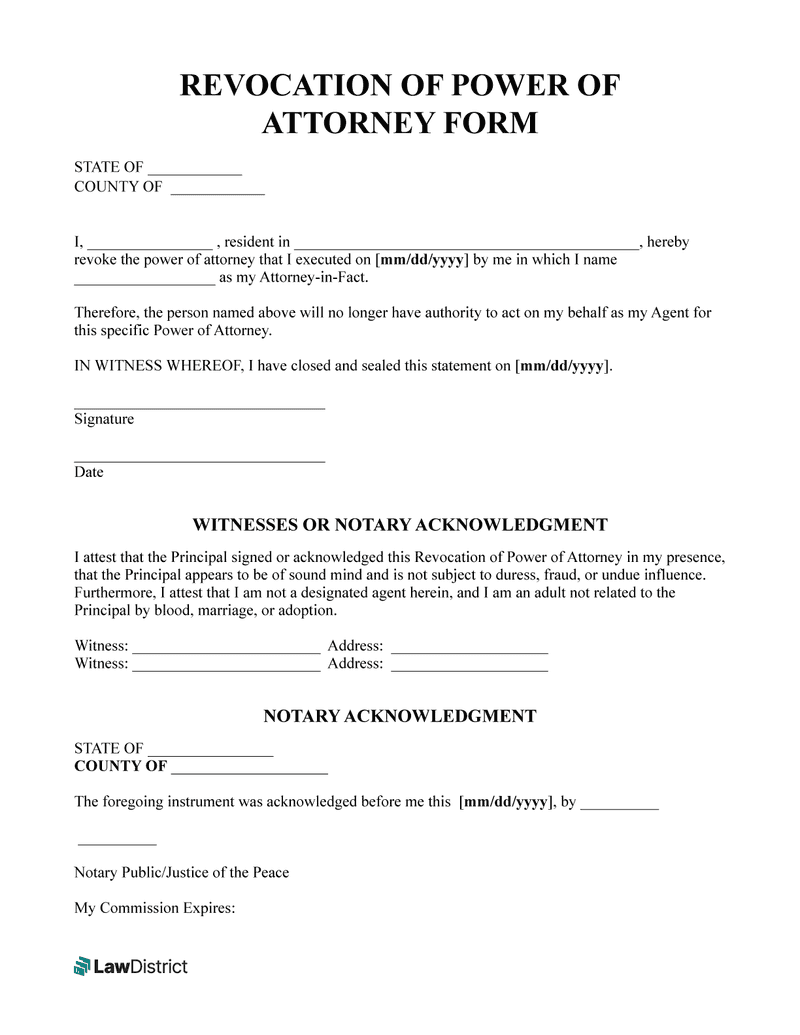REVOCATION OF POWER OF ATTORNEY
I, _________, residing at _________, hereby formally revoke the power of attorney that I initially granted on _________. This power of attorney appointed _________ with a permanent residence at _________ as my agent. Effective immediately, _________ no longer holds the authority to act on my behalf. Any authority previously granted to _________ by the aforementioned power of attorney is hereby revoked, canceled, and terminated as of this ________ day of ________________, ________.
IN WITNESS WHEREOF, I have hereunto set my hand and seal at the City of _________ in the State of Alabama this ________ day of ________________, ________.
SIGNED, SEALED, AND DELIVERED
in the presence of:
____________________________________
WITNESS Address: ____________________________ ____________________________________ |
____________________________________
WITNESS Address: ____________________________ ____________________________________ |
____________________________________
_________
I, the undersigned witness, hereby acknowledge that:
1. I observed the signing of the Revocation of Power of Attorney pertaining to _________, dated this ________ day of ________________, ________.
2. I am of legal age and possess the capacity to witness the signing of the Revocation of Power of Attorney.
3. In my professional opinion, _________ had the requisite capacity to comprehend the nature and consequences of the Revocation of Power of Attorney at the time of signing. Furthermore, _________ executed the Revocation of Power of Attorney willingly and voluntarily, without any undue compulsion or influence from any person.
Signature: __________________________
Name: ____________________________
Address: ___________________________
I, the undersigned witness, hereby acknowledge that:
1. I observed the signing of the Revocation of Power of Attorney pertaining to _________, dated this ________ day of ________________, ________.
2. I am of legal age and possess the capacity to witness the signing of the Revocation of Power of Attorney.
3. In my professional opinion, _________ had the requisite capacity to comprehend the nature and consequences of the Revocation of Power of Attorney at the time of signing. Furthermore, _________ executed the Revocation of Power of Attorney willingly and voluntarily, without any undue compulsion or influence from any person.
Signature: __________________________
Name: ____________________________
Address: ___________________________
PRE-SIGNING REQUIREMENTS: Instructions for Executing Your Revocation
Prior to executing your Revocation of Power of Attorney, please ensure the following steps are duly observed:
1. Thorough Understanding: Before affixing your signature, thoroughly read and comprehend the contents of the document.
2. Signature Requirement: For the document to attain validity, it is imperative that you sign it using your customary check signing style.
3. Presence of Notary or Witnesses: The signing process must occur in the presence of either your notary or witnesses.
4. Notary and Witnesses Signatures: Following your signing, both your notary and witnesses are required to sign the document in your presence.
By adhering to these steps, you contribute to the proper execution and validity of the Revocation of Power of Attorney.
Signature: __________________________
Date: ______________________________
Please note that individuals who qualify as witnesses for your document cannot include your spouse, partner, child, your agent or alternate agent, or the spouse of your agent or alternate agent. Additionally, in some jurisdictions, witnesses mentioned in your will, whether as a beneficiary or executor/executrix, may be disqualified. It is advisable to refrain from selecting witnesses with any financial ties to you. The chosen witnesses must meet the legal age requirements in your jurisdiction and must possess mental capacity.
NOTICE OF REVOCATION: Effecting Your Revocation
To ensure the effectiveness of your revocation, it is essential to provide timely and confirmed notice of the revocation. This involves ensuring that the written revocation is successfully received by the agent and any third party impacted by the power of attorney (such as financial institutions, land registries, and individuals).
Mailing the revocation without confirmed receipt is insufficient. It is imperative to verify that all relevant parties have indeed received the revocation. Consider employing double-registered mail or personal delivery for this purpose.
Moreover, if your power of attorney granted authority over real estate, it is recommended to register the revocation, including a legal description of the property, with the County Clerk's Office or deed registry in the location of the property.
Date: __________________________
Signature: _______________________
REQUEST FOR DOCUMENT RETURN
Kindly request your agent to promptly return all copies of the power of attorney. It is imperative to ensure that the term 'Revoked' is distinctly marked on each copy, preventing any unintended use in the future.
This precautionary measure aims to safeguard against potential misuse or misunderstanding of the power of attorney, reinforcing the clarity of its revoked status. Your prompt attention to this matter is greatly appreciated.
